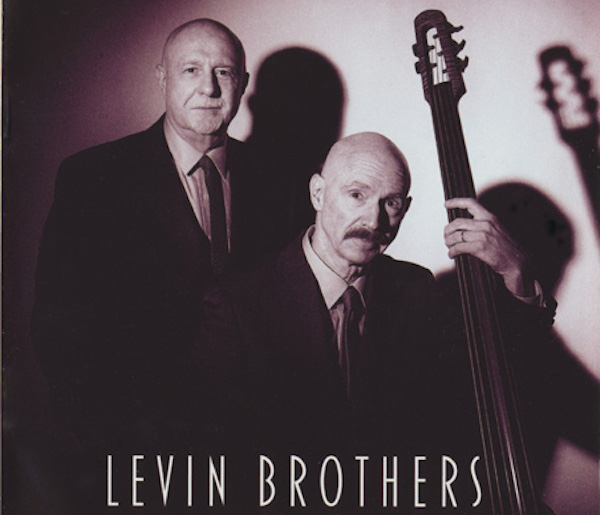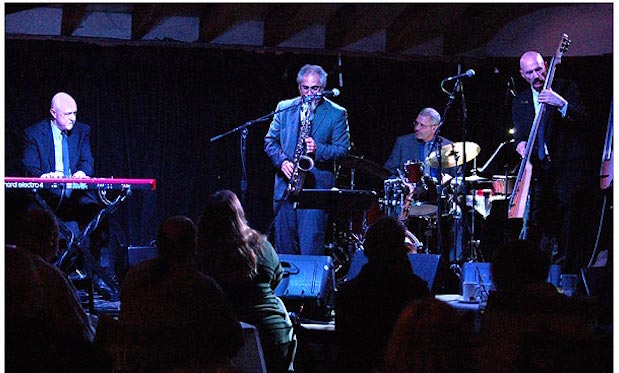Concert Preview: Local Boys Make Cool Jazz — The Levin Brothers Reunite
One of my favorite quotes from Gil Evans is, “Quit playing what you think I want you to play!”

By Jason M. Rubin
There must not have been much quiet in the Levin household in Brookline, MA. Pete,
born December 20, 1942, and Tony, born June 6, 1946, both studied music from a young age, both went to prestigious music schools (Juilliard and Eastman, respectively), and both have maintained high-profile careers as first-call sidemen (keyboardist Pete largely with jazz artists, most notably as a member of the Gil Evans Orchestra; bassist Tony largely with rock artists, most notably as a member of King Crimson and Peter Gabriel’s backing band). Sharing a classical foundation, deep jazz chops, and huge talent that have taken them all around the world, the Levin brothers have individually accumulated countless credits while only occasionally stepping out front as leaders.
That changed in 2014 and 2015, when the Levin brothers became The Levin Brothers, touring in support of their first recording together, the eponymous, well-received Levin Brothers, on the independent Lazy Bones Recordings. The 16 tracks were polished cool jazz originals (one a cover of King Crimson’s 1981 composition, “Matte Kudasai”). Pete (piano and organ) and Tony (cello and bass) were joined by Erik Lawrence on tenor sax, Jeff Siegel on drums, and David Spinozza on guitar. Tony’s old Eastman College classmate Steve Gadd played drums on two tracks.
Now, two years later, the Levin Brothers are back, hitting the U.S. after a brief South American tour as a quartet, minus Spinozza. They will perform at the Natick Center for the Arts on March 30. The Arts Fuse interviewed Pete via email just as rehearsals for the tour were beginning.
Pete Levin: We’ve both been touring with different bands and as band leaders for decades. We’ve already learned about the ups and downs, the realities, and the knowledge that just when you think everything is fine, you’ll turn a corner and get hit in the face with a pie. Except for the economies of the places we travel to, not much has changed since the ‘70s when we both hit the road. There’s a lot more competition now, fewer places to play, less money. But touring still offers the best opportunities to be creative and earn a living. Playing in the jazz genre is a fulfilling experience, but not the best paying work – it never was. We love this particular project, but others have taken priority in our schedules over the last two years. We’re really happy to have worked out this window to do a Levin Brothers tour.
AF: Was there anything that surprised you about audiences’ reception of your music and how the music itself evolved through live performance?
Levin: I don’t think there were any surprises. We were well-received everywhere on the 2015 tours. At first we were a little bit tight and careful about performing, trying hard to stick close to our album. In time the band loosened up and it became fun. Predictably, the later shows on the tour were the best. We did add to the repertoire as we went. Tony and I have past associations with major pop artists. Tony especially is well-known for his work with Peter Gabriel and King Crimson, and we toured together with Paul Simon. It was only natural that there would be Gabriel and Crimson fans coming to our shows. Over time, we added jazz arrangements of some classic Gabriel and Paul Simon songs.
AF: Is there a second album in the works, or new material that you are presenting this time around?
Levin: There’s a plan, but the “works” haven’t started yet. As with the two-year touring gap, we’ve both been too busy. Tony has been with King Crimson, possibly out of the country more than he was home last year. We are planning to record live somewhere near the end of this tour.
AF: Given you both are so busy, is lack of continuity a challenge in terms of your ability to fall back into this cool jazz-type groove? Or is it easier because you know the music and each other so well?
Levin: Well, we’re four seasoned road rats. Academically, we know what to do to get back to it. But easy…no. We’re doing a week of rehearsal before we start the tour. We’re going to need it!
AF: As musicians, do you prefer more intimate settings to larger halls, or is certain kinds of music more suited to certain spaces?
Levin: Suitability does change with different music. Some shows belong in big venues, with lights, big sound, etc. A jazz quartet can be that, but it seems more appropriate in an intimate setting. There’s a feedback that comes from being close to an audience, where you’re able to see beyond the first few rows. You can see and feel people’s reactions, and to some extent the audience feels involved with the musicians.

The Levin Brothers in action. Photo: Greg Ruggieri.
AF: Can you talk about how you came to hire Erik and Jeff for the band?
Levin: The basic plan was to recruit two jazz musicians who, besides being skilled players, understood the genre and the concept we were after. We do stray into the contemporary, but the music is rooted in the ‘50s post-bop cool jazz era. Erik and Jeff both get it, and they’re into it. I’ve known them both for years, and played with them often in different settings. They both brought a lot to the project and continue to do so. And it’s definitely a plus to be with friends when you’re spending six hours in a van every day!
AF: You’ve played so many different types of music and gigs, and have accumulated a lifetime of lessons and inspirations; is it a challenge to figure out what to apply to a given project, or do you let the goal of the project govern the way you want to write and play?
Levin: Tony and I have divergent musical careers, but share the same background, training, and studio experience. A sideman’s goal should be to make the music as good as it can be. Sometimes you can inject your own style; sometimes that’s not appropriate. You call on your experience and play what you think works best and hopefully feel good about it. There’s another lesson for a sideman: leave your ego out in the car. One of my favorite quotes from Gil Evans is, “Quit playing what you think I want you to play!” Food for thought.
Jason M. Rubin has been a professional writer for 31 years, the last 16 of which has been as senior writer at Libretto, a Boston-based strategic communications agency. An award-winning copywriter, he holds a BA in Journalism from the University of Massachusetts Amherst, maintains a blog called Dove Nested Towers, and for four years served as communications director and board member of AIGA Boston, the local chapter of the national association for graphic arts. His first novel, The Grave & The Gay, based on a 17th-century English folk ballad, was published in September 2012.
Tagged: Jason Rubin, Lazy Bones Records, Pete Levin, The Levin Brothers
